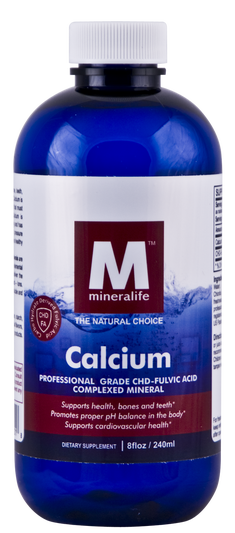Description
Liquid ionic Calcium makes sure that your body can utilize the maximum amount of your Calcium supplement. This is important as an excess of underutilized Calcium can lead to kidney stones and other conditions.*
Calcium Helps to Support
•Strong bones and teeth*
•Regulation of metabolism*
•Regular sleep*
•Regulation of the body’s pH levels*
•Activation of numerous enzymes within the body*
•Healthy muscle function*
•Stress relief*
•Positive moods*
Calcium: One of the Most Important Minerals
Calcium is the mineral that our body uses in the largest quantities. Everyone knows Calcium is required to build bones and teeth but Calcium does so much more. It promotes blood clotting & healing. It is involved in regulating metabolism and in particular, the metabolism of fats. It is necessary to maintain the proper pH balance in the body, and Calcium helps regulate the blood pressure, leading to better cardiovascular health.*
Unfortunately, Calcium is a mineral of which most Americans do not get enough. While vitamin D can assist in the utilization of Calcium, it helps to begin with a form of calcium that is readily assimilable by the body. Our liquid ionic Calcium supplement is the most bio-available form you can get.*

Diets high in calcium may reduce the risk of osteoporosis Calcium is most known for its ability to build strong bones and teeth. Osteoporosis is a condition common with age that results in very weak and brittle bones. Fortunately, it can be prevented. It is a known fact that adequate calcium intake throughout life, as part of a well-balanced diet, may reduce the risk of osteoporosis. Using a high quality Calcium supplement can help supplement your diet and aid your body in building strong, dense bones and ensure your excellent health well into old age.*
Calcium Supports Weight Loss Most Americans are watching their weight. This can be a concern, however, as dieting can lead to a deficiency in Calcium and osteoporosis later in life. Several studies have found that calcium not only maintains strong bones, but also assists in weight loss and maintaining a healthy weight. Don’t risk your health later in life with crash dieting. Take a Calcium supplement to protect the health of your bones. And according to recent research, you’ll gain improvements in your weight loss as a side benefit.*
Why Mineralife Calcium Supplement?
•Prepared from a pure elemental source
•Angstrom-sized, water soluble minerals (IsoIonic™) provide the greatest absorption and utilization in the body.
•Formulated using our patent-pending MET water, a multi-step purified energy enhanced water that helps activate minerals into their electronically charged ionic state for maximum benefit
•Contains CHD-Fulvic Acid to enhance absorption and overall well-being.
•2.5ml (1/2 cap) provides 14% of the daily value for calcium.
•8oz bottle provides 96 day supply.
*96 Day Supply*
An advanced aqueous form of Calcium Ions (IsoIonic™)** in clear solution for quicker absorption than tablets or capsules which must first dissolve in the digestive system before being absorbed. Patented, clinically tested professional grade CHD-Fulvic Acid has been added to further increase absorption and enhance overall well-being as fulvic acid has natural anti-viral, anti-bacterial, anti-inflammatory, and detoxification properties.
Concentration: 57,600 PPM or mg/L
The FDA concluded that “Adequate calcium throughout life, as part of a well-balanced diet, may reduce the risk of osteoporosis later in life.”
Why Calcium Is Vital For Far More Than Just Strong Bones
It’s well known that adequate calcium is essential for the maintenance of strong, healthy, bones and teeth, and indeed this is where around 99% of the approximately 1.2 kg stored in the average adult human body is to be found. But this is not in fact this vital mineral’s most important function within the body, because calcium is also needed in the blood in very precise quantities to ensure that certain vital physiological processes can carry on unimpaired.
These include the constriction and dilation of blood vessels essential for the body’s internal temperature regulation, the transmission of nerve impulses, the release of energy for muscle contraction, the secretion of certain vital hormones such as insulin, and the clotting of the blood. As evidence for the importance of these functions it is only necessary to observe that the body will strip the bones of calcium in order to maintain the necessary blood levels of the mineral should these be in danger of falling too low because of inadequate dietary intake. Since the bones, like all the body’s structures, are in a constant state of regeneration and repair, the potential consequences if this deficiency is allowed to persist over time can be catastrophic.
In extreme cases, deficiency in children and adolescents may lead to the weakness and malformation characteristic of the disease, rickets. In adults, especially older adults, the most obvious consequence may be the loss of bone density known as osteoporosis – a major cause of the greatly increased incidence of the serious fractures which are such a significant risk factor for the health of the elderly.
But there are other problems which may be associated with low intakes of calcium.
There is good evidence to implicate low calcium intake as a risk factor for the development of high blood pressure during pregnancy (pre-eclampsia) in those women who are susceptible to this potentially dangerous condition; and, interestingly, research has shown that supplementation with calcium to a daily intake of 1,000 1,200 mg a day may also be effective in reducing blood pressure in the general population. A number of studies have linked low levels of calcium with pre-menstrual syndrome (PMS) and indicate that supplementation may help reduce the severity of these symptoms.
There is even now some evidence that low calcium intakes may tend to encourage the body to deposit more fat within existing fat cells. Although the relationship is not fully understood, it appears safe to say that a plentiful supply of dietary or supplemental calcium is essential for success in the pursuit of any weight loss program.
Given the importance of calcium in all these ways, it’s alarming to note that average intakes for most people in the developed world are known to fall well short of the suggested level, and the figures are particularly serious for adolescents whose growing bones who have the greatest need. Perhaps as many as 75% of boys and 90% of girls in this age group may be calcium deficient.
Dairy products are by far the best sources of dietary calcium and an 8 oz serving of milk or yoghurt, or 1 ½ oz of cheese, will provide around 300 mg of calcium. Leafy green vegetables, with the exception of spinach, are also a useful source, although you would need 3 – 4 servings of, for example, broccoli or kale, to match the calcium obtained from a single standard glass of milk. It should also be realized that The consumption of diets high in protein and salt, ie those characteristic of the affluent Western world, is known to increase the excretion of calcium and consequently the risk of deficiency and associated problems with bone strength and health.
Owing to this, and a number of other possible variables affecting the individual’s need for dietary calcium, the Food and Nutrition Board has set out figures for Adequate Intake (AI) of the mineral rather than the Recommended Dietary Allowance (RDA) which it commonly prescribes for vitamins and other vital nutrients. Babies and infants should begin with an intake of around 200 mg per day, rising to 800 mg by the age of eight. Children of nine and over, young people whose bones are still growing, the over 50s, and pregnant or breast-feeding women, will have higher needs and should aim to consume 1,200 to 1,300 mg of calcium a day.
To maintain the health and density of fully formed bones, adults between about 20 and 50 should aim to consume 1,000 mg of calcium daily, through a combination of diet and supplements. In all cases, combining this supplementation with at least 400 IU of vitamin D will greatly assist with the absorption of the necessary calcium.
Calcium supplements should also always be taken with food; the recommended upper safe limit for total calcium intake being 2,500 mg, below which there should be no problems. However, since high calcium intakes can adversely affect the absorption of other essential minerals, notably magnesium, zinc and iron, it is recommended that supplementary calcium should always be taken as part of a comprehensive multi-mineral supplement.



Reviews
There are no reviews yet.